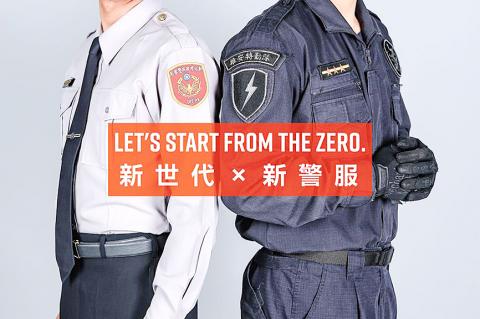New police uniform designs are to focus on comfort and convenience, as well as reducing gender differences, Deputy Minister of the Interior Hua Ching-chun (花敬群) said yesterday after the National Police Agency initiated the first redesign in decades.
“We want officers’ uniforms to be comfortable and convenient for their work,” Hua said.
“As this issue was not thoroughly taken into consideration 30 years ago, that is what we will focus on this time around,” he said.

Photo: CNA, provided by the National Police Agency
The current uniform has been in place with only minor adjustments since 1988, when changes to reduce similarities to military uniforms were instituted shortly after the end of the Martial Law era.
The Legislative Yuan last year passed amendments to the Police Uniforms Act (警察服制條例), granting the ministry power to set uniform standards, with the aim of removing gender differences and deleting provisions that female officers wear skirts as part of their summer uniform.
The National Police Agency last week held meetings on the new standards, with a Facebook post by National Police Agency Director-General Chen Kuo-en (陳國恩) drawing more than 300 comments and more than 5,000 “likes.”
“I hope that this time we can make the uniforms more similar to those of stormtroopers, because the current ones are extremely inconvenient for grappling with suspects and making arrests,” said netizen Henry Chen (陳永仁), who identified himself as a police officer.
Formal leather shoes that police wear have poor grip, making it easy to slip and get injured during a chase, Chen said.
Netizen Yao Hsien-yang (楊曜先), also a police officer, recommended that police be allowed to wear polo shirts during the summer and called for the elimination of formal dress pants and jackets in favor of cargo pants.
The Chinese-language China Times reported that an internal police survey found that 37 percent of officers favored getting rid of the ties as part of official uniforms, while 24 percent favored keeping them.
The National Police Agency is to collect opinions over the next month before consulting with design professionals and holding a nationwide vote on design finalists.
Hua said that there is no timeline for deciding the final design.
Additional reporting by Chiu Chun-fu and Wu Jen-chieh

Taiwan’s Liu Ming-i, right, who also goes by the name Ray Liu, poses with a Chinese Taipei flag after winning the gold medal in the men’s physique 170cm competition at the International Fitness and Bodybuilding Federation Asian Championship in Ajman, United Arab Emirates, yesterday.

Costa Rica sent a group of intelligence officials to Taiwan for a short-term training program, the first time the Central American country has done so since the countries ended official diplomatic relations in 2007, a Costa Rican media outlet reported last week. Five officials from the Costa Rican Directorate of Intelligence and Security last month spent 23 days in Taipei undergoing a series of training sessions focused on national security, La Nacion reported on Friday, quoting unnamed sources. The Costa Rican government has not confirmed the report. The Chinese embassy in Costa Rica protested the news, saying in a statement issued the same

A year-long renovation of Taipei’s Bangka Park (艋舺公園) began yesterday, as city workers fenced off the site and cleared out belongings left by homeless residents who had been living there. Despite protests from displaced residents, a city official defended the government’s relocation efforts, saying transitional housing has been offered. The renovation of the park in Taipei’s Wanhua District (萬華), near Longshan Temple (龍山寺), began at 9am yesterday, as about 20 homeless people packed their belongings and left after being asked to move by city personnel. Among them was a 90-year-old woman surnamed Wang (王), who last week said that she had no plans

TO BE APPEALED: The environment ministry said coal reduction goals had to be reached within two months, which was against the principle of legitimate expectation The Taipei High Administrative Court on Thursday ruled in favor of the Taichung Environmental Protection Bureau in its administrative litigation against the Ministry of Environment for the rescission of a NT$18 million fine (US$609,570) imposed by the bureau on the Taichung Power Plant in 2019 for alleged excess coal power generation. The bureau in November 2019 revised what it said was a “slip of the pen” in the text of the operating permit granted to the plant — which is run by Taiwan Power Co (Taipower) — in October 2017. The permit originally read: “reduce coal use by 40 percent from Jan.